
Director: Craig Gillespie
Release Year: 2023
Runtime: 1h 45min
With so many choices in this world, why on Earth would I watch a movie about the GameStop short squeeze? And what on Earth is a short squeeze? Honestly, after watching Dumb Money, I’m not certain I know the answer to either of these questions. Other than to say that it feels like something I want to know about, and I don’t have the patience to read intellectual articles about the subject. I mean, the word “dumb” is right there in the title. And I’m dumb. So maybe they’ll dumb it down for dummies like me. Because this is ostensibly a comedy and not meant as a true document of what happened when one schlub from suburban Massachusetts decided to start pumping up GameStop stock after realizing some rich douche-like assholes were shorting it. Causing what amounted to a disruption of the assumed ways of working on Wall Street led by a bunch of young people looking to make some quick cash, but also stick it to the man. Short squeeze!
Okay, I’m not going to pretend to actually understand the economics of this whole thing. That’s Ms. Hipster’s area. But as a movie, it’s a pretty fun way to try to bring to light an actual thing that happened to actual people. It definitely has a lot of Wolf of Wall Street energy. But on a way smaller budget. And with way less ambition. It’s like the 8-bit version of that movie. I liken the heightened versions of these humans — who were mostly real — to something like Vice. Though that was chock full of people we know. Caricatures of George Bush and Dick Cheney and that cast of numbskulls. This one was filled with a bunch of people most of us have never heard of — though Ms. Hipster did have actual, real-life experiences with one of the major dudes in this movie. I won’t say which one, but suffice it to say that the portrayal of him in the movie was not far from the truth of his generalized rich-guy douchebaggery. Which — when it comes down to it — is kind of the point of the whole film: people with money have money because they have money. And people without money are generally locked out of the system that lets them get money. Populism!
Enter basement-dwelling nerd, Keith Gill (Paul Dano). With his cat memes and spreadsheets he managed to reach the non-investing-class young people through social channels, convincing them that dorky stock GameStop was way undervalued and worth throwing a few dollars at. I do feel like some of the weirdo Reddit, gamergate culture of misogyny and dick jokes — even if it’s mostly directed at the rich-guy class — was something that I bumped on a bit. But I’m an old and Internet meme culture just seems like crude nonsense to me. Though I do get a lot of cat videos in my Instagram feeds. And sloths. And red pandas. So I get it. But not really. But the point is that Gill and his info and the way it’s disseminated gave rise to the non-investment class’ exposure to that world. Students, nurses and actual clerks at GameStop. All of them could take advantage of his advice and invest through the Robinhood app. An app that doesn’t require you to have a broker or charge outrageous fees for trading. The thing is, Gill’s intentions are pure. He is not a cynical investor. He’s principled. And in his dedication to the cause and his radical transparency, he gains the trust and admiration of this group of atypical young investors. If only those Robinhood bastards were as down with the cause as him…
Ultimately, the movie is light and comical. They even use Pete Davidson properly as Keith’s dirtbag brother. Like this is what Davidson would be if he didn’t somehow luck into acting and whatever magical power he has to pull beautiful and talented ladies. The whole of the plot is set up a bit like the actual Robin Hood tale. Though Dano luckily doesn’t try the Costner accent. The narrative is breezy and doesn’t get too bogged down in the economics of it all. And it’s fun to watch Seth Rogen (as Gabe Plotkin) sweat as his short position gets plundered by Gill and the different folks we focus on as fictional examples of investors. Because watching rich assholes shake is funny. There is some irony that this film was produced by the Winklevoss twins, which kind of undermines the whole message of the little guy getting over on the wealth class. Though there is the whole connection between them and author, Ben Mezrich. Who wrote the book The Accidental Billionaires, which was turned into The Social Network. And then wrote The Antisocial Network, which was turned into this movie. It all feels a little… entangled. I suppose when Mezrich writes his bitcoin book and they turn it into a movie starring Alexander Skarsgård as the Winklevosses — and maybe call it the Anti-Antisocial Network — we’ll see if and how they’re portrayed in that. Until then, we’re left with this cute, little film that captured a moment in time that feels like a million years ago now.


